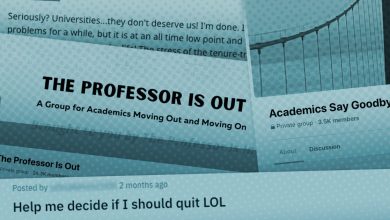Who Wants to Be a College President?

Ambrose, who became chancellor of Henderson State University, in Arkansas, two months ago, had left higher education in 2018 to lead a nonprofit, after two stints as a university leader. But he returned to a search process so different, he felt like he was experiencing it for the first time.
“It’s not the same job they would have hired me for in 2018,” Ambrose said.
The past few years have brought on a growing list of challenges for even the wealthiest and most selective institutions: a pandemic, widespread political backlash, enrollment declines, and the public’s questions about the value of college. At some colleges, choosing a new president could be an existential decision.
“Even at very established institutions, the stakes are higher,” said Robin Mamlet, a senior partner with the search firm WittKieffer.
As a result, some boards have changed their search criteria. Today, they’re often looking for someone risk-tolerant who is willing to push through major changes. At the same time, board members, who typically come to their jobs with business experience and political ties, may also feel they’re better equipped to pick a president without input from faculty, staff, and students.
Candidates for president, too, are becoming pickier about the kinds of colleges they want to work at, said several new campus leaders, by requiring a clear picture of the institution’s finances and the board’s expectations.
“In a moment where the landscape is shifting, I wanted to be at an institution where the board had its eyes wide open with respect to the challenges,” said Susan Wente, who became the president of Wake Forest University in July 2021.
“Presidents have to be able to weave and dodge,” she said. “It’s certainly a more challenging job, but it attracts people for whom that is exciting.”
Kyle Farmbry, who started as the new president of Guilford College on January 1,said the growing financial and political pressures on higher education require new leaders to be more strategic than in the past, and to have an entrepreneurial mindset.
Even at very established institutions, the stakes are higher.
At the same time, he said, “you have to be someone who believes in the value of higher education. That’s not going to change because of a crisis.”
For Ambrose, the goals of reviving the rural campus of Henderson State, in Arkadelphia, and improving the learning experience there were part of the allure of the new job.
Seeing colleagues manage through the worst of the pandemic also made Ambrose feel like he should still be trying to contribute through service.
“I was in awe of what leaders were doing for their communities,” he said, “and moved by what students were having to experience, and I felt a little guilty sitting on the sidelines.”
This year, significantly more college presidents have resigned than last year, with some acknowledging the myriad pressures and crises that led to their decisions.
“The past two years have been a challenging and intense journey,” said Steven C. Currall in July, announcing his resignation after two years as president of the University of South Florida. “The intensity of the past two years has put a strain on my health and my family.”
According to Chronicle data, 107 presidents announced their resignations in 2021. That’s far more than the roughly 80 presidents who announced their resignations in 2020, but fewer than the 123 announcements in 2019. The data include only the retirements and resignations that ran in The Chronicle’s Gazette. The figures exclude presidents who were forced to resign, left under a cloud of controversy, or cited health concerns in stepping down.
The higher-education practice at WittKiefer started a record number of searches in each month from July through October last year (not all of them for presidents), Mamlet said, and hired 18 new staff members to manage the increased demand.
Sally Mason, a consultant with the Association of Governing Boards of Universities and Colleges search group and former president of the University of Iowa, said that from a board’s perspective, they are “investing a lot in this person and would like to know that they’re physically fit.”
Wente, who was the provost and interim chancellor at Vanderbilt University before her appointment at Wake Forest, said she and other leadership candidates have been asked to submit to psychological testing. That has included consultations with a mental-health professional who can evaluate things like leadership style and ability to build relationships, she said.
The results are shared only with the head of the search committee, Wente said. The process can be intimidating, but she has used the results to try to improve her own leadership, she said.
Candidates, too, are asking harder questions of search committees and governing boards. Mason said candidates are now more interested in the financial situation of the college, so that they’re not surprised when they start a new job.
If a college relies heavily on tuition dollars “and enrollments are plummeting, and you don’t ask about changing the budget model, you’re going to be in a world of pain,” Mason said.
Potential presidents are also probing the culture and climate of the institution, Mason said, including whether the board is functional.
Wente, who is the first woman to be Wake Forest’s president, said she wanted to make sure board members were unified in purpose and vision, and had a realistic view of the future of the institution. She also considered the search process itself, she said, including how transparent the search was and how faculty and student input was received.
The past two years have been a challenging and intense journey.
In addition, she said, she would only consider offers of employment from institutions that reflected her own values, and where she wouldn’t be viewed as a token of diversity.
Kevin R. McClure, an associate professor of higher education at the University of North Carolina at Wilmington, said the growing list of requirements to fill a job may make it harder to find a good match between what the board wants and what a candidate can actually deliver.
In addition, the increased vetting by both boards and candidates is a sign that the room for error in leadership is shrinking.
“There may not have been as much vetting in the past because we gave leaders more leeway to learn on the job,” McClure said. “The reality is that boards aren’t now giving that space, and campus constituencies aren’t, either.”
Most troubling, McClure said, is that as the skill set for a president shifts from an academic leader to a business executive, the search process could become even less transparent than it already is. Boards, often composed of people with business backgrounds and political connections, may rely on their own experience in choosing a leader who has similar skills and experiences, he said, while shutting out faculty members with expertise in education and research.
David Maxwell, a senior fellow and consultant with the AGB and a former president of Drake University, said boards learned during the pandemic that they would get backlash for making decisions without involving a wide range of constituents. Similarly, criteria for a leadership search should be a culmination of conversations with campus stakeholders, Maxwell said.
“A crisis is a lousy time to find out your governance structure isn’t working.”
Audrey Williams June contributed to this report.
Source link






